
[ad_1]
TB is common throughout the world
If you were born in or frequently travel to countries where TB is common, including some countries in Asia, Africa, or Latin America, you have a higher chance of being infected with TB germs. You may be at risk even if you have lived in the United States for a long time.
TB germs can live in the body without making you sick. This is called inactive TB, or latent TB infection. People with inactive TB are infected with TB germs, but they do not have active TB disease. They do not feel sick, do not have any symptoms, and cannot spread TB to others.
Without treatment, people with inactive TB can develop active TB disease at any time and become sick.
TB germs become active if the immune system can’t stop them from growing. When TB germs are active (multiplying in your body), this is called active TB disease. People with active TB disease feel sick. They may also be able to spread the germs to people they spend time with every day. Without treatment, active TB disease can be fatal.
Some people think that because they were screened during their immigration process to the United States, they are not at risk for TB. However, immigration exams mainly screen for active TB disease.
If you received the TB vaccine
Bacille Calmette-Guérin (BCG) is a vaccine for TB disease. The vaccine is not generally used in the United States. It is given to infants and small children in countries where TB is common. It protects children from getting severe forms of active TB disease, such as TB meningitis.
Tell your health care provider if you have received the TB vaccine, especially if you are getting tested for TB infection because it can cause a false positive TB skin test reaction. TB blood tests are the preferred tests for people who have received the BCG TB vaccine.
Places with increased risk
You have a higher risk of being exposed to TB germs if you were born in or frequently travel to countries where TB is common, such as some countries in Asia, Africa, and Latin America.
Travelers
While traveling, avoid spending time with someone who has active TB disease. You should also avoid crowded places where TB is known to spread, including:
A traveler’s chances of exposure to TB germs on a plane are very low.
Prevention
People who were born in or who frequently travel to countries where TB is common
If you were born in or frequently travel to countries where TB is common, talk to your health care provider about getting tested.
If you have inactive TB, treating it is the best way to protect you from getting sick with active TB disease.
If you have active TB disease, you can be treated with medicine. You will need to take and finish all of your TB medicine as directed by your health care provider. This is to help you feel better and prevent other people from getting sick.
Travelers planning to work in health care settings
If you are traveling to work in a clinic, hospital, or other health care setting where patients with active TB disease are likely to be, talk with infection control or occupational health experts.
If you think you may be around people with TB disease for long periods of time while traveling, get a TB blood test or a TB skin test before leaving the United States.
- If the test reaction is negative, repeat the test eight to ten weeks after returning to the United States.
- Annual testing may be recommended for people who anticipate
- Repeated or prolonged exposure or
- An extended stay over a period of years.
- If you have HIV, talk to your health care provider.
- People with HIV are more likely to have an impaired response to TB tests.
[ad_2]

